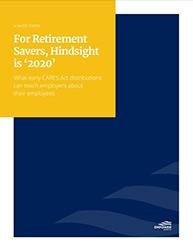What early CARES Act distributions can teach employers about their employees
For a large segment of the American population, the COVID-19 pandemic has been a time of financial hardship. As a result, many employees have turned to alternative sources of income to cover essential expenses like rent, monthly bills and healthcare costs.
According to Personal Asset research, some Americans have taken advantage of the Coronavirus Aid, Relief, and Economic Security (CARES) Act provision to draw from their retirement accounts early. New Personal Asset data shows that while some of these employees have used the money to pay for trips or make major purchases, most have used it to cover basic needs or pay off debts.
By better understanding employees’ financial decisions over the last year, employers can determine how to support them going forward.
How employees spent early retirement withdrawals
The CARES Act allowed individuals under the age of 59½ to withdraw as much as $100,000 from their retirement accounts without paying the 10% penalty normally faced by savers who withdraw funds early. Only about 4.4% of eligible participants in an Personal Asset plan completed CARES Act withdrawals in 2020. Still, that figure represents more than 500,000 CARES Act withdrawals.
According to a new survey conducted by the Harris Poll on behalf of Personal Asset Retirement, people who took early distributions spent them on a variety of expenses, such as:
- Basic needs like food and rent (36%).
- Paying off debt (35%).
- Padding their savings account (31%).
- Creating or adding to an emergency fund (23%).
Why some employees tapped into their retirement savings
Employees who called Personal Asset to discuss CARES Act withdrawals had many different reasons for their interest in withdrawing retirement money early, including:
- Job loss or impending job loss.
- Inability to access social services.
- Increased expenses due to the pandemic.
- Distrust in the markets.
Most employees see early withdrawals as a last resort
A July 2020 survey conducted by the Harris Poll on behalf of Personal Asset Retirement found that most employees would consider several other options before resorting to taking money out of their retirement accounts.
More than a third of respondents who hadn’t had to cope with COVID-related financial challenges said if they needed access to additional funds, their first step would be to reduce spending. A fifth (20%) said they would start by dipping into their savings or emergency fund, 13% said they would defer a student loan payment, and 12% said they would sell something of value.
Just 12% said their first step would be to stop contributing to their retirement savings while only 8% said they would first take money out of their workplace retirement savings accounts.
How employers can better support their employees
Employers who educate their employees about their options can help them avoid the worst financial consequences of the COVID pandemic — and better prepare them for future challenges.
Employers can provide employees personalized advice offerings that evolve based on the unique needs of each employee. These solutions should incorporate sophisticated technology, be backed by human interaction and use event-driven communications to give employees the support they need to make smart retirement savings decisions.
Employers can also make employees aware of assistance programs. And they can remind employees who withdrew from their retirement accounts early that they can restore their savings by paying back their distributions.
Key takeaways:
- About 500,000 Personal Asset plan participants took advantage of the CARES Act provision that allowed for early withdrawals from retirement accounts without the 10% penalty.
- Employees had many reasons for withdrawing funds, but most used the money for basic needs, like food and rent, and for paying off debt.
- Most employees see early withdrawals as a last resort during times of financial hardship.
- Employers can help support employees by educating them on all their options and providing personalized advice and solutions.
Download research paper







